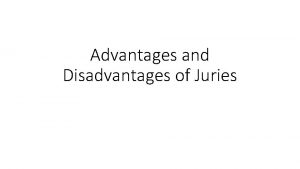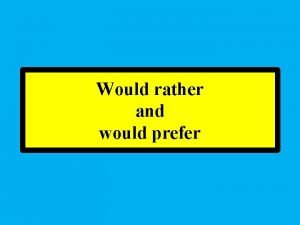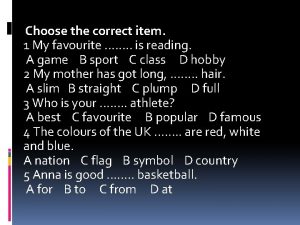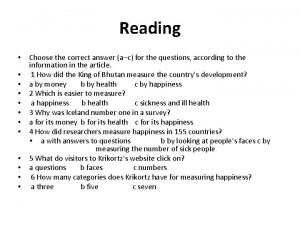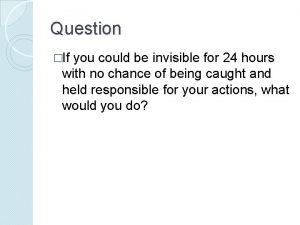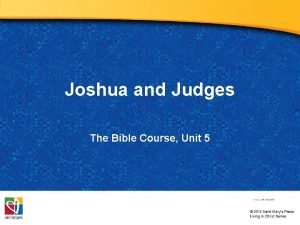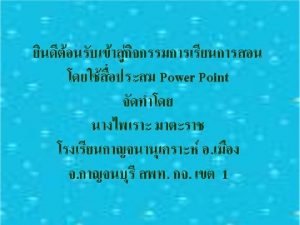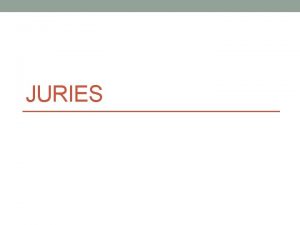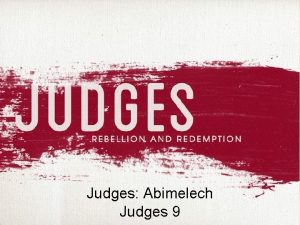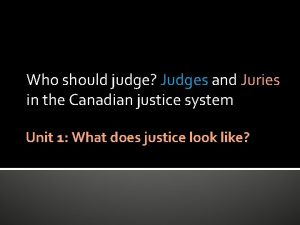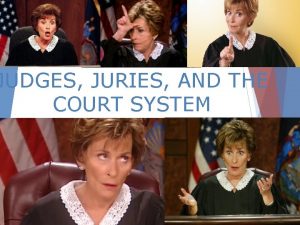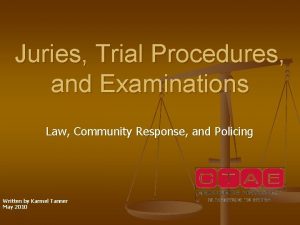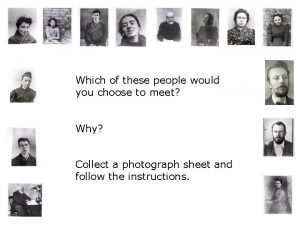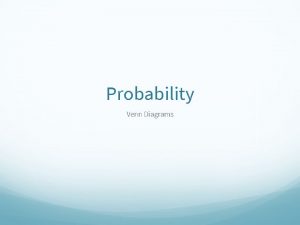Judges and Juries Which would you choose Trial













- Slides: 13

Judges and Juries Which would you choose?

Trial by Judge or Jury? • A jury lets the public see conflicts resolved by peers, rather than by a judge along. • A jury reflects the conscience of the community. • A jury is expensive, however, and they are used only for more serious indictable offenses. • For less serious indictable offenses, the accused can choose between trial by judge or trial by judge and jury. • A judge alone will try the accused for summary offenses.

Advantages of Trial by Judge • Judges may be less prejudiced than some jurors, who may look down on an accused who is poorly dressed, for example. • Some jurors may also allow disgust at an offence – such as child abuse or impaired driving – to cloud their judgment. • Legal technicalities may confuse jurors. • A jury may be as convinced by the eloquence of a good Crown prosecutor or defence counsel as by actual evidence. • A judge is trained to make a decision based on the facts and the law. • A judge presents reasons for his/her decision – a jury does not.

Advantages of Trial by Jury • Trial by jury involves the public in the administration of justice, which also helps to educate the public. • The use of juries means that judges do not have to make all the court decisions. • Juries are composed of people from many different backgrounds, who bring a fresh perspective to the courtroom and who can reject oppressive laws. • Juries may base their decisions on current social values, rather than strict legal precedent. • The defense needs to convince only one juror to favour the accused or have reasonable doubt; a jury’s decision must be unanimous. • Dramatic rhetoric may be more likely to move a juror than a judge, who hears lawyer’s arguments routinely. • A jury may feel empathy for the accused, especially if the charge is one with which they identify.

Offenses Requiring Trial by Jury • • • Murder Treason Alarming her Majesty Intimidating Parliament or a legislature Bribery by the holder of a judicial office Seditious (or subversive offenses) Piracy or piratical acts Inciting to mutiny Attempting or conspiring to commit any of the above offenses Accessory to murder or treason

Jury Selection • Expanelling – the process of selecting the 12 jurors – can take many days. • 1. A list of jurors is created from a list of all people living in the area where the court is located. Generally, prospective jurors must be Canadian citizens, between the ages of 18 and 69, and speak either English or French. • 2. A selection committee headed by the sheriff then randomly picks 75 to 100 names from the list. • 3. The people selected are summoned to appear at the court by notice from the sheriff. If a juror fails to appear, they can be issued a warrant and can even be criminally charged.

Jury Selection • 4. Prospective jurors gather in the courtroom and cards with each of their names are placed in a barrel. Each person steps forward after his/her name is drawn. • 5. The judge may exempt anyone with a personal interest in the case, a relationship with a trial participant, or a personal hardship. The judge can also direct a juror to stand aside for any reasonable cause. • 6. If a full jury cannot be selected from the remaining prospective jurors, those asked to stand aside will be called again. • 7. The defence and the Crown prosecutor can then accept or reject them as jurors.

What to consider when selecting jurors? • How might an older male, a feminist, an older female, or a young bachelor view the accused in a case involving obscenity? • How might a juror sharing the same race/ethnicity as the accused react in a racially motivated crime? • How might a woman and man view the accused claiming battered wife syndrome differently? • How might a father view the accused in a rape case? • Ethnicity, religion, age, financial status, occupation, sexual orientation, intelligence, and gender are only a few characteristics that are considered. http: //www. winnipegfreepress. com/canada/jury-selection-set-to-begin-in-murder-trial-of-luka-roccomagnotta-274299151. html

Who is usually exempted from Jury Duty and why? • • MPs, senators, members of provincial legislatures and municipal governments Judges, justices of the peace, lawyers, law students Doctors, coroners, veterinarians Law enforcement officers, special constables, sheriffs, prison wardens and guards, and their spouses People who are visually impaired People with mental or physical disability that seriously impairs their ability to complete jury duty Anyone who has served on a jury within the preceding two or three years Anyone convicted of an indictable offence that has not been pardoned • http: //www. thestar. com/news/canada/2012/12/21/supreme_court_of_canada_approv es_right_to_screen_jury. html

Challenges • Challenge of Jury List: • Either side can challenge the jury list if it can be shown that the sheriff or selection committee was fraudulent or partial, or showed willful misconduct in selecting prospective jurors. • Challenge for the cause: • Is made on the basis that prospective jurors do not meet the provincial or territorial requirements governing juries (e. g. non-citizen, language, prior knowledge/opinion of the case). • Peremptory Challenge: • Allows both the defence and Crown to eliminate a prospective juror without giving a reason. Each side is allowed a set number of challenges based on the crime: • High treason or first-degree murder – 20 challenges • A charge where a penalty is five years or over – 12 challenges • A charge where the penalty is under give years – 4 challenges

Juror Conduct • In all trials, jurors must not: • Discuss the case with anyone other than other jurors • Follow media reports about the case • Disclose any information from jury discussions that is not revealed in open court • http: //www. thecanadianencyclopedia. ca/en/article/guess-guilty-ofobstruction/ • http: //globalnews. ca/news/390421/calgary-woman-accused-of-jurytampering-in-psychiatrist-husbands-trial-charged/

Is jury sequestering effective? • During most trials today, jurors go home at the end of each day. The judge may, however, sequester the jury for the entire trial. • What is the purpose of sequestering? Is it necessary/effective? Can a person truly avoid exposure to the media in today’s society? 12 Angry Men • https: //www. youtube. com/watch? v=mz. Pll 63 y 2 b 0

From the perspective of a foreman… • https: //drive. google. com/file/d/0 Bwofq. U 2 Tt. Or. ERG 9 HNl. ZWLVVDa 1 E/ view • Would you rather be tried by judge or jury? Why/why not?
 Profession i would like to choose
Profession i would like to choose Jury system advantages and disadvantages
Jury system advantages and disadvantages Would like would prefer would rather
Would like would prefer would rather Would like would prefer would rather
Would like would prefer would rather 5.choose the correct item
5.choose the correct item Thank you speech for judges
Thank you speech for judges Q and a criteria for judging
Q and a criteria for judging Choose the correct answe
Choose the correct answe Read and choose the correct answer
Read and choose the correct answer If you could be invisible what would you do and why?
If you could be invisible what would you do and why? Judges cycle
Judges cycle Third conditional
Third conditional If you had not studied hard
If you had not studied hard If you could see the future what would you do
If you could see the future what would you do

